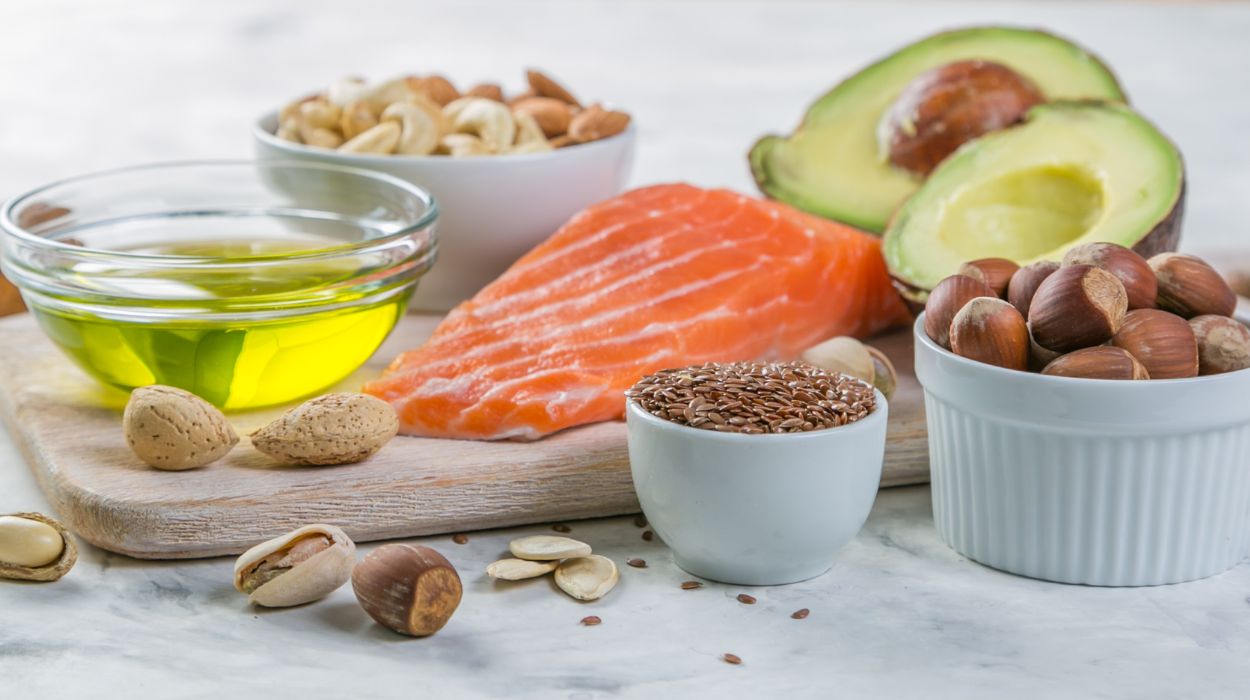 Evidence Based
Evidence Based
Evidence Based
This article is objectively based on relevant scientific literature, written by experienced medical writers, and fact-checked by a team of degreed medical experts.
Our team of registered dietitian nutritionists and licensed medical professionals seek to remain objective and unbiased while preserving the integrity of any scientific debate.
The articles contain evidence-based references from approved scientific sites. The numbers* in parentheses (*1,2,3) will take you to clickable links to our reputable sources.
Keto For Women 2024: Is It Effective For Women?

The ketogenic diet is a diet plan that is predominantly made up of fat-containing foods, minimal carbohydrates, and a moderate amount of protein. Historically it was used as an epilepsy treatment among children[1] of certain ages and it is still done within controlled settings at various pediatric hospitals. However, in recent years, coming to a metabolic state called ketosis, has also become popular as a means to lose weight. This diet has especially grabbed the attention of women as it can be a way to reduce belly fat, lose weight, and maintain a healthy body weight.
When exploring keto for women, it is vital to discuss its effectiveness, benefits, risks, and even various life stages where ketogenic diets may not be advisable. Keto diets can be a great tool to manage blood sugar, increase fat loss, and as well as increase weight loss. However, it also needs to be noted that it is a low-carb diet that may not be sustainable for many people over a long period of time. Therefore, following a keto food list would be a great tool in the process.
Is Keto Effective For Women?
Yes, it is. This low-carb, moderate protein and high-fat diet can assist those with high blood sugar since high-carb foods are often limited on this diet plan. Following a low carbohydrate diet can reduce insulin resistance, lower blood sugar levels, and improve blood sugar control. It can give the illusion that the diet plan is there to burn fat, however, during ketosis, the body simply changes the fuel it uses to obtain energy.
Keto For Women: Is Keto Effective For Women?
There are many factors in a women’s health history that the ketogenic diet may assist with. Keto by definition only has 10% or less of its calorie sources coming from carbohydrates. This low-carb, moderate protein and high-fat diet can assist those with high blood sugar since high-carb foods are often limited on this diet plan. Following a low carbohydrate diet can reduce insulin resistance, lower blood sugar levels, and improve blood sugar control. It can give the illusion that the diet plan is there to burn fat, however, during ketosis, the body simply changes the fuel it uses to obtain energy.
Keto For Women: Benefits & Potential Risks

Keto For Women Benefits
The internet is full of success stories of women who have had substantial fat loss and even better blood sugar regulation from keto dieting. There is even evidence that supports the concept that a diet high in fat can even decrease factors that can lead to heart disease[2] such as lowering triglycerides and increasing HDL. There are some promising results of supplemental ketone precursors and cancer treatment within animal studies, however, there is nothing research suggests on whether there is a direct link between keto and cancer treatment.
Unlike intermittent fasting or calorie restriction, a keto lifestyle curbs carb intake and decreases consumption of processed foods. Keto meals that promote metabolic health often consist of healthy fats and low-carb vegetables. Following a keto diet plan can also decrease food cravings and therefore decrease calorie intake.
Keto For Women Potential Risks
Some of the risks of the keto diet especially when starting out include the keto flu which can encompass various symptoms such as diarrhea, nausea, vomiting, muscle aches, headaches, and some fatigue. Diarrhea may also be persistent even past the recovery of the keto flu since the keto diet is extremely high in fat and it can trigger the liver to release extra bile to break down all of that extra fat. Bile in itself is a natural laxative, therefore, having excess bile in the system can cause loose stools and even speed up the transport of the stool through the digestive tract. However, on the flip side, some keto dieters may experience constipation since the lower carb intake also means less high-fiber foods.
When Should You Avoid A Vegan Keto Diet?
When You Are Pregnant

Pregnancy is a time of great growth, development, and change. It is not the time to take on new eating habits and altering food intake can be pretty drastic in nature. Keto has been shown[3] to be a diet plan that promotes weight loss and as a way of decreasing body fat stores. However, pregnancy[4] is not the time for fat-burning and weight loss. It is a time to have healthy weight gain and maintain adequate energy levels and muscle mass. Therefore, a diet that is extremely high in fat and has its only source of protein be plant-based, may not be the best new diet plan to start during pregnancy. However, if one is already a vegan prior to pregnancy, a healthy pregnancy can be maintained especially when multivitamins are consumed throughout the duration.
When You Had/Have An Eating Disorder
Another group of women who would not benefit from a very low-carb diet such as Keto are those with a history of eating disorders.[5] The restrictive nature of the diet can be triggering and can cause the person to focus on losing weight. Those who are recovering from an eating disorder may still be malnourished, and therefore restricting carbohydrates within a diet plan would not be a beneficial endeavor. Even those who are currently suffering from an eating disorder should avoid an extremely restrictive diet such as Keto since they often need to avoid losing more weight. Those with eating disorders will have a difficult time recovering if they continue to be on restrictive diets such as keto.
When You Have Medical Conditions
There are certain medical conditions for which a keto diet plan can be detrimental. Individuals who have issues with their liver would have a difficult time processing all of the extra fat that is part of the diet. Those who have issues with their pancreas and are at risk for high triglycerides may have the condition exacerbated under this diet plan as well. Even people who have diabetes and take insulin need to be cautious when initiating the keto diet. The diet has the potential to cause hypoglycemia (low blood sugar) and when the individual is also taking insulin to lower blood sugar, in combination, it can be very detrimental.
Final Thought
The ketogenic diet can be an effective diet plan for weight loss and blood sugar management. There is still a lot of research to be done in order to examine the multiple benefits of low-carb diets, especially within endometrial or ovarian cancer and heart disease risk factors.
However, it is vital to remember that it is not considered a healthy diet for individuals with certain underlying medical conditions, such as liver and pancreatic disorders, pregnancy, or a history of eating disorders. Certain other diet plans such as the Mediterranean diet, low-fat diet, or high-fiber diet may be better suited for those individuals. However, it is also important to remember that fewer carbs coupled with healthy fat and lean protein have always been shown to be a healthy plan.
+ 5 sources
Health Canal avoids using tertiary references. We have strict sourcing guidelines and rely on peer-reviewed studies, academic researches from medical associations and institutions. To ensure the accuracy of articles in Health Canal, you can read more about the editorial process here
- Marzena Ułamek-Kozioł, Czuczwar, S.J., Januszewski, S. and Pluta, R. (2019). Ketogenic Diet and Epilepsy. [online] 11(10), pp.2510–2510. doi:https://doi.org/10.3390/nu11102510.
- Dowis, K. and Banga, S. (2021). The Potential Health Benefits of the Ketogenic Diet: A Narrative Review. [online] 13(5), pp.1654–1654. doi:https://doi.org/10.3390/nu13051654.
- Ting, R., Dugré, N., Allan, G.M. and Lindblad, A.J. (2018). Ketogenic diet for weight loss. Canadian family physician Medecin de famille canadien, [online] 64(12), p.906. Available at: https://www.ncbi.nlm.nih.gov/pmc/articles/PMC6371871/.
- Waldman, S.D., Eede, van, Wong, M.H., Susan Lee Adamson and Henkelman, M. (2013). Effects of a ketogenic diet during pregnancy on embryonic growth in the mouse. [online] 13(1). doi:https://doi.org/10.1186/1471-2393-13-109.
- Hay, P. (2020). Current approach to eating disorders: a clinical update. [online] 50(1), pp.24–29. doi:https://doi.org/10.1111/imj.14691.



